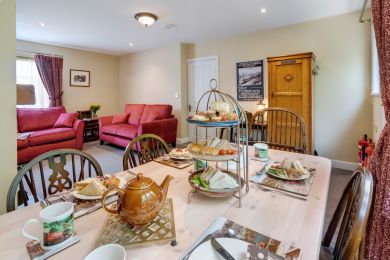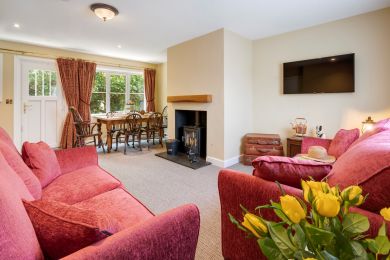Ravenglass holiday cottages
NEW
£628 - £967
£621 - £1,139
£562 - £964
£579 - £1,086
£562 - £1,062
Keep me updated with new properties, holiday ideas and special offers!
Please enter a valid email address.
At Sally's Cottages, part of The Travel Chapter Group, your privacy is paramount to us. You can read in our privacy statement how we safeguard your data. You can opt out at any time.
£579 - £1,086
£663 - £882
£362 - £583
£574 - £854
£593 - £986
NEW
£528 - £913
Ravenglass
Ravenglass is where three rivers meet (Esk, Irt, and Mite) to form an estuary and natural harbour. 2000 years ago, it was the location for an important Roman port and military fort and later became a bustling fishing town. Today, Ravenglass is better known as the starting point for the Ravenglass & Eskdale steam railway (La’al Ratty). This is the land of Bronze Age settlements, Roman forts, ancient churches, medieval castles and many other hidden delights.
Take A Trip On the La’al Ratty
This narrow-gauge railway has become one of Cumbria’s much-loved attractions, providing an unforgettable steam-driven trip through Eskdale to delight young and old alike. La’al Ratty is Cumbrian dialect for ‘little track’, referring to the narrow-gauge (15 inch/38 cm) track of the Ravenglass & Eskdale Railway. It was built in 1875 to bring iron ore from the mines near Boot to the coastal railway, and was the first narrow-gauge railway ever to be laid in England.
Romans at Ravenglass
The Romans built a major port at Ravenglass (c. 79 AD) to supply the inland forts with goods and men, which was defended by a nearby fort (Glannoventa). Very little remains of the fort itself but nearby is one of the best remaining examples of a bath house. Its walls are said to be the highest in England. The bathhouse (known as Walls Castle), where legions of Roman soldiers came to wash, is one of the best-preserved Roman buildings in the north of England. The walls are surprisingly high at nearly 4 metres (12 ft), with traces of original Roman plaster in situ. Two rooms survive but excavations have revealed more rooms, with hot, warm and cold baths. The earthworks of the adjacent fort can be seen in the field opposite.
Roman Trail From Ravenglass To Muncaster
Follow in the footsteps of the Roman soldiers from Ravenglass to Muncaster on an easy circular walking route. From Ravenglass, take the track to ‘Walls Castle’ – the remains of the Roman bath-house. Continue on the track and fork left at the next junction. Once you reach Newtown House, turn left and head up and over the hill to Muncaster. On your return, take the path towards the castle’s main gate, but before you reach it turn left along a footpath that follows a small beck downstream through Decoy Wood. This will take you back to the footpath near Newtown House. Turn right on the track and head back the way you came.
Muncaster – Fools And Ghosts Aplenty!
Muncaster Castle sits on a natural rock platform and commands far-reaching views down Eskdale. It is thought that this was formerly the site of a Roman signal station, which connected with the fort at Ravenglass. The present house is built around an ancient pele tower and has been occupied by generations of the same family (the Penningtons) since 1208.
In the 1600s, Tom Skelton was the court jester at Muncaster, but he wasn’t the benign ‘fool’ you might be led to believe. His exploits earned him a far more sinister reputation. If travellers were discourteous to him, he was known to direct them onto the quicksands of the estuary. He is also believed to have murdered the castle’s carpenter. These acts gained him a notorious reputation and brought a new word into the English language – ‘tomfoolery’. Each May, Muncaster enjoys five days of mayhem and madness during its celebrated Festival of Fools.
Muncaster is reputedly one of the most haunted buildings in the country. Visitors have reported seeing a woman dressed in black and a crying child, while others notice a definite chill in the room on entering. It is said that the ghost of Tom Skelton still plays tricks on unsuspecting visitors. Each year there are overnight ‘ghost vigils’ when you can stay in the haunted Tapestry Room, but only if you’re brave enough to do so!
Explore Ancient Churches
The west coast of Cumbria is awash with interesting old churches, many of which can trace their roots back to the so-called ‘Dark Ages’. Here are three in the Ravenglass area:
St Paul’s Church at Irton has an Anglo-Saxon cross with richly decorated surfaces with vine scrolls, rosettes and interlacing knotwork. Definitely worth a visit!
Muncaster Churchbcontains memorials to the Pennington family. The chancel windows were installed in memory of four friends of Lord Muncaster who were killed after being held hostage in Greece in 1870.
St John’s Church at Waberthwaite is a simple, rendered church overlooking the estuary and an old fording point. Two ancient crosses suggest this has been a religious site for a very long time. The shafts are decorated with interlace weaving and animal figures, and represent a fusion of Anglian and Scandinavian artistic styles.
Explore Nature
Eskmeals Dunes is a spit of land at the mouth of the River Esk, formed of sand dunes, shingle, mudflats and salt marsh and colonised by over 300 species of plants and animal. Look out for wild pansy, natterjack toads, dark green fritillaries and oystercatchers. The reserve is approached by minor roads from Waberthwaite or Bootle. There is open access at all times except when firing is taking place on the adjacent gun range (check if the flag is flying).
Drigg Dunes Nature Reserve is another area of sand dunes, saltmarsh and shingle, supporting specialised communities of flowers and insects. Natterjack toads are known to breed in the dune slacks. The reserve can be accessed on foot from the car park at Drigg beach.
Step Back In Time
It might surprise you that the area around Ravenglass has been continuously occupied for over 5000 years. Mesolithic flints have been found in the sand dunes around Ravenglass, and the surrounding fells are literally dotted with Bronze Age burial and clearance cairns (more than 2000 have been identified). On the flanks of Birkby Hill (east of Ravenglass) lies the ‘lost city’ of Barnscar with numerous hut circles, livestock enclosures and burial cairns – accessed by bridleway from the A595.
Cycling around Ravenglass
Explore the beauty of Ravenglass and Eskdale by mountain bike or electric bike.
The Eskdale Trail is an 8½ mile fully way-marked and virtually traffic-free cycle route through Eskdale. The guide book is available in most local outlets and includes a full description of the route and a map. Most cyclists put their bikes on the steam train between Ravenglass and Dalegarth (40 mins) and then cycle back along the designated route. Bikes must be pre-booked on the train and cycles can only be taken on board at Ravenglass and Dalegarth stations.
Mountain bikes can be hired from West Lakes Adventure.
Useful Links
- Ravenglass has three pubs: the Ratty Arms, the Pennington Hotel and the Holly House Hotel.
- Have a look at our Review of Outdoor Activities in the Lake District.
- Try kite flying at Haverigg nearby.
- Cumbrian Wildlife.
- Click here for Dog Friendly pubs in the Lake District.
- Read about Sally's Cottages in the Lake District and our pet friendly cottages.





